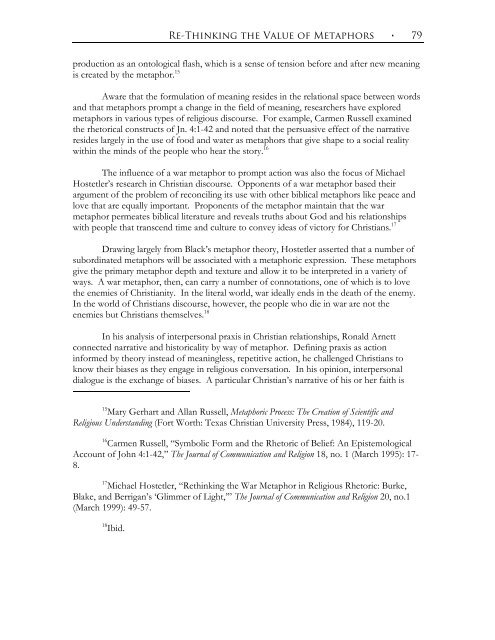0 jbtm vol. 6, no. 2 the proclamation of the gospel - Baptist Center for ...
0 jbtm vol. 6, no. 2 the proclamation of the gospel - Baptist Center for ...
0 jbtm vol. 6, no. 2 the proclamation of the gospel - Baptist Center for ...
Create successful ePaper yourself
Turn your PDF publications into a flip-book with our unique Google optimized e-Paper software.
Re-Thinking <strong>the</strong> Value <strong>of</strong> Metaphors ٠ 79<br />
production as an ontological flash, which is a sense <strong>of</strong> tension be<strong>for</strong>e and after new meaning<br />
is created by <strong>the</strong> metaphor. 15<br />
Aware that <strong>the</strong> <strong>for</strong>mulation <strong>of</strong> meaning resides in <strong>the</strong> relational space between words<br />
and that metaphors prompt a change in <strong>the</strong> field <strong>of</strong> meaning, researchers have explored<br />
metaphors in various types <strong>of</strong> religious discourse. For example, Carmen Russell examined<br />
<strong>the</strong> rhetorical constructs <strong>of</strong> Jn. 4:1-42 and <strong>no</strong>ted that <strong>the</strong> persuasive effect <strong>of</strong> <strong>the</strong> narrative<br />
resides largely in <strong>the</strong> use <strong>of</strong> food and water as metaphors that give shape to a social reality<br />
within <strong>the</strong> minds <strong>of</strong> <strong>the</strong> people who hear <strong>the</strong> story. 16<br />
The influence <strong>of</strong> a war metaphor to prompt action was also <strong>the</strong> focus <strong>of</strong> Michael<br />
Hostetler’s research in Christian discourse. Opponents <strong>of</strong> a war metaphor based <strong>the</strong>ir<br />
argument <strong>of</strong> <strong>the</strong> problem <strong>of</strong> reconciling its use with o<strong>the</strong>r biblical metaphors like peace and<br />
love that are equally important. Proponents <strong>of</strong> <strong>the</strong> metaphor maintain that <strong>the</strong> war<br />
metaphor permeates biblical literature and reveals truths about God and his relationships<br />
with people that transcend time and culture to convey ideas <strong>of</strong> victory <strong>for</strong> Christians. 17<br />
Drawing largely from Black’s metaphor <strong>the</strong>ory, Hostetler asserted that a number <strong>of</strong><br />
subordinated metaphors will be associated with a metaphoric expression. These metaphors<br />
give <strong>the</strong> primary metaphor depth and texture and allow it to be interpreted in a variety <strong>of</strong><br />
ways. A war metaphor, <strong>the</strong>n, can carry a number <strong>of</strong> con<strong>no</strong>tations, one <strong>of</strong> which is to love<br />
<strong>the</strong> enemies <strong>of</strong> Christianity. In <strong>the</strong> literal world, war ideally ends in <strong>the</strong> death <strong>of</strong> <strong>the</strong> enemy.<br />
In <strong>the</strong> world <strong>of</strong> Christians discourse, however, <strong>the</strong> people who die in war are <strong>no</strong>t <strong>the</strong><br />
enemies but Christians <strong>the</strong>mselves. 18<br />
In his analysis <strong>of</strong> interpersonal praxis in Christian relationships, Ronald Arnett<br />
connected narrative and historicality by way <strong>of</strong> metaphor. Defining praxis as action<br />
in<strong>for</strong>med by <strong>the</strong>ory instead <strong>of</strong> meaningless, repetitive action, he challenged Christians to<br />
k<strong>no</strong>w <strong>the</strong>ir biases as <strong>the</strong>y engage in religious conversation. In his opinion, interpersonal<br />
dialogue is <strong>the</strong> exchange <strong>of</strong> biases. A particular Christian’s narrative <strong>of</strong> his or her faith is<br />
15 Mary Gerhart and Allan Russell, Metaphoric Process: The Creation <strong>of</strong> Scientific and<br />
Religious Understanding (Fort Worth: Texas Christian University Press, 1984), 119-20.<br />
16 Carmen Russell, “Symbolic Form and <strong>the</strong> Rhetoric <strong>of</strong> Belief: An Epistemological<br />
Account <strong>of</strong> John 4:1-42,” The Journal <strong>of</strong> Communication and Religion 18, <strong>no</strong>. 1 (March 1995): 17-<br />
8.<br />
17 Michael Hostetler, “Rethinking <strong>the</strong> War Metaphor in Religious Rhetoric: Burke,<br />
Blake, and Berrigan’s ‘Glimmer <strong>of</strong> Light,’” The Journal <strong>of</strong> Communication and Religion 20, <strong>no</strong>.1<br />
(March 1999): 49-57.<br />
18 Ibid.


